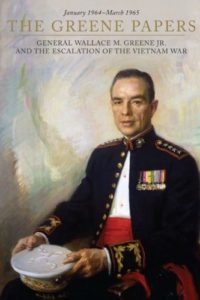 In his influential 1997 book Dereliction of Duty, H.R. McMaster described the Joint Chiefs of Staff as “Five Silent Men” who acquiesced to a gradual escalation of the conflict in Vietnam without a clear vision of how military action would secure American policy aims. The Greene Papers, Nicholas Schlosser’s carefully curated selection of General Wallace Greene’s official and personal papers from January 1964 through March 1965 provides the reader a window into one of those men’s thoughts during that critical period of decision for America’s involvement in Southeast Asia.
In his influential 1997 book Dereliction of Duty, H.R. McMaster described the Joint Chiefs of Staff as “Five Silent Men” who acquiesced to a gradual escalation of the conflict in Vietnam without a clear vision of how military action would secure American policy aims. The Greene Papers, Nicholas Schlosser’s carefully curated selection of General Wallace Greene’s official and personal papers from January 1964 through March 1965 provides the reader a window into one of those men’s thoughts during that critical period of decision for America’s involvement in Southeast Asia.
As Commandant of the Marine Corps from 1964 to 1967, General Wallace Greene presided over the Corps’ deepening involvement in Vietnam and its wartime expansion. His contemporaneous notes and memos provide an enlightening perspective on the Joint Chiefs deliberations as well as the rivalries and interests that combined to shape the history of the era. Although McMaster reviewed and cited General Greene’s papers in Dereliction of Duty, much of the material remained classified until 2011, and was housed at the Marine Corps Historical Division in Quantico. Schlosser’s compilation of Greene’s papers therefore provides those unable to visit the Historical Division the opportunity to review first-hand accounts of meetings between the Joint Chiefs, Secretary of Defense McNamara and President Johnson.
The majority of the documents in The Greene Papers comprise General Greene’s own notes and formal memoranda for the record of meetings at which he was present as well as written summaries of meetings submitted to him by those who attended on his behalf. It also includes messages and cables from his subordinates, such as LtGen. Victor Krulak, Commander Fleet Marine Forces Pacific, and diplomatic cables from the U.S. Embassy in Saigon. Together, they show both the type of information General Greene and the other Chiefs were receiving as well as the Commandant’s and others’ thoughts and judgments regarding the situation in Vietnam and the trajectory of American involvement.
Schlosser’s meticulous footnotes and cross-references allow the reader to situate each document in the appropriate context. He is careful to note whether a document is one of the detailed memoranda for the record which General Greene kept early in his tenure or has been derived from transcripts based on Greene’s oral history based on his original notes during interviews with the Historical Division after he retired. Schlosser records and highlights marginal notes and pen and ink corrections on the original documents in a way that allows the reader to picture the type- and hand-written originals. Where appropriate, he includes internal cross-references to other documents in the volume, as well as to other readily accessible sources, such as Foreign Relations of the United States. The documents are arranged chronologically, with each assigned a short title. If there is any shortcoming in the editing, it is the absence of these short titles in the table of contents, which groups entries by date only.
While by no means a casual read, The Greene Papers makes accessible these documents previously available only to those able to travel to Quantico. While many will still make that trip to view the full collection, the casual historian and serious scholar alike will benefit from the preview that Schlosser places in their hands.
The Greene Papers: General Wallace M. Greene Jr. and the Escalation of the Vietnam War, January 1964-March 1965
By Nicholas J. Schlosser, U.S. Marine Corps, History Division, Quantico, VA, (2016).
Reviewed by LtCol. Robert Weingart USMC, Military Faculty, Joint Forces Staff College.

